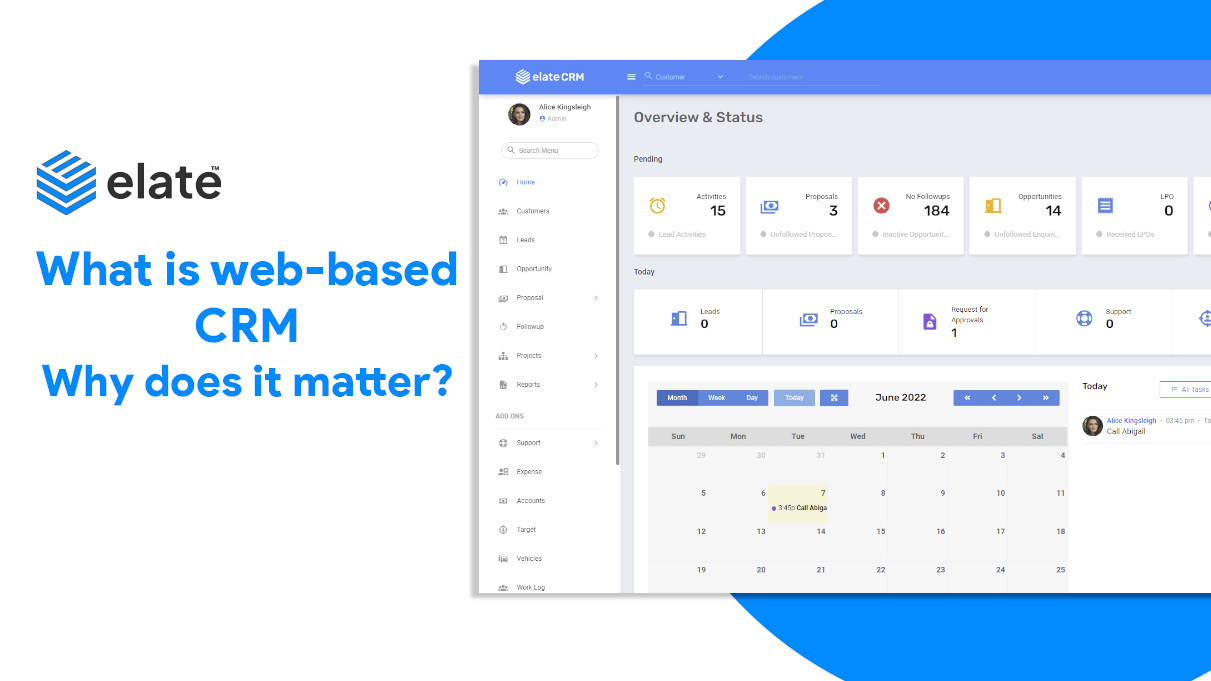
1/31/2025
What is web-based CRM, and why does it matter?
You understand as a business owner how vital solid customer relationships are to your company’s success. You may manage these relationships with the use of a customer relationship management (CRM) system along with its web-based CRM application. It can increase client retention, loyalty, and consumer happiness.
As a popular substitute, web-based CRMs are simple to set up, and manage and are reasonably priced. This article will examine web-based CRM applications, walk you through the advantages of using them, and contrast some of the most popular solutions available.
Small and medium business owners can manage operational issues including client attrition, declining sales, misalignment between corporate revenue targets and their salespeople’s commission policies, and more, with the help of web-based CRM applications.
What is a Web-based CRM application?
The CRM will serve as the main repository for all the data you’ve accumulated during your client relationships. From the first moment they read a blog article or subscribe to your newsletter through the phone recordings of sales calls and lead verification, everything will be in one single area. CRM even controls the workflow by providing contracts, invoices, and proposals.
The servers of a web-based CRM maintain your client data. This information is available online and is accessible from anywhere. You can use it to automate procedures, get real-time customer insights, and more.
To use the functions of the software, you don’t need to run or update it; the vendor takes care of that for you. The servers of a web-based CRM store your client data. In contrast to on-premise CRM systems, web-based CRM systems are hosted online.
Benefits of using a web-based CRM:
Cost-Effectiveness:
In general, a web-based CRM system is less expensive than an on-premises CRM system. There is no immediate requirement for hardware or IT infrastructure. In addition, many CRM companies offer pay-as-you-go pricing plans. Businesses can modify their usage as necessary. This can assist companies in making financial savings and better resource allocation. As a result, there is an elevation in profitability and growth.
Scalability:
Choose a web-based CRM solution for your small business if you want a versatile system. Scaling up or down is simple as needed. It enables organizations to adapt to expanding customer demands. For businesses that face demand volatility, this may be very advantageous. Your web-based CRM will have the functionality to meet your company’s demands as they change, no matter how big or small it grows.
Simple accessibility:
If you have an Internet connection and login credentials, you can access web-based CRMs for small businesses from any location. Additionally, they frequently have mobile and web versions. i.e., you can use both PCs and mobile devices to access the software. If your organization has team members that are dispersed over the globe and always on the move, this functionality is useful.
Improved Collaboration:
Team members can effortlessly share information with a web-based CRM. Wherever they are, they may talk to one another. For instance, if a member of the sales team receives a client question, they can promptly inform the customer support or marketing teams.
Installing is simple:
The simplicity of installation is another advantage of selecting a web-based CRM over an on-premise CRM. There is no need for you to install any hardware, software, or licenses. Instead, you visit the vendor’s website, register, and then may utilize its customer relationship management tools right away.
More effective lead generation and conversion:
Businesses may track and handle leads more efficiently with the aid of a web-based CRM. It enables them to sort and pursue the most promising leads first. Companies may improve their odds of turning leads into customers by streamlining this process, which will result in growth.
Enhancing Data Security:
Since a web-based CRM is housed in the cloud and is subject to strict security protocols, it is typically more secure than a conventional, on-premises system. Businesses may experience more peace of mind as a result. They are no longer concerned about data security breaches and can concentrate on expanding their business.
Features for choosing the right web-based CRM application.
The following elements are the most crucial ones to look for in a CRM for your small business:
Advanced analytics for tracking campaigns:
Viewing your marketing success at the campaign level is essential since it allows you to understand how you’re doing specifically rather than just overall. This will enable you to determine which strategies are most successful at bringing clients and leads to your company, as well as which platforms and tools within those campaigns are working the best. By using analytics, you may establish benchmarks and determine whether the statistics you are seeing are rising or falling in comparison to a prior time or condition.
Dynamic real information:
You shouldn’t have to wait until a campaign’s or a month’s end to see results. Real-time data features in a competent CRM will allow for on-demand insight generation. This enables you to spot potential campaign improvements, take advantage of opportunities as they present themselves, and make sure your objectives are being met.
Customized reports:
Gather, compile, and monitor essential information about your consumers along the sales funnel. This will guarantee that team members use credible customer data to make more smart business decisions.
Integration:
You can avoid switching back and forth between applications if your present tech stack can be integrated with a web-based CRM. A few examples of third-party integration types are email, calendar, ERP, and documents.
Efficient communication:
Communication tools are the last but not the least of the list of CRM elements to consider. With an email connection, additionally, you can engage with your contacts directly from the CRM and can have an update on new leads and important activities.
List of best web-based CRM application providers UAE
Elatesoft:
Elate Soft provides simple access to Dashboards, Leads management, Opportunity, Proposal, and Follow-up automation. Additionally, CRM software offers secured Settings, real-time reports, employee management, and guarded Settings. For organizing, streamlining, and managing your processes throughout the whole sales cycle, it is a perfect solution. Users can use its features without knowing how to code because it is completely customizable. Elatesoft serves as the best CRM software for small businesses.
Hubspot:
HubSpot CRM is a web-based CRM application created to support the development of customer relationships throughout the entire customer journey. , it has statistics for teams that are expanding as well as tools for sales communication.
Zoho:
Zoho is one of the well-known web-based CRM programs, not just in the UAE but all across the world. The purpose of CRM software is to assist you in acquiring, retaining, and meeting the needs of your customers.
Conclusion
Finally, using CRM for small and medium-sized firms can improve their customer service processes. For instance, in addition to giving insight into customer order trends, it enables your support staff to reply to client inquiries swiftly. It also ensures that they never make a mistake while answering questions from clients about their orders.




